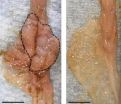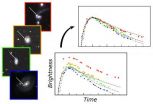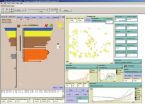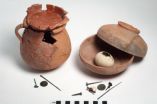(Press-News.org) HOUSTON — For women with breast cancer undergoing radiation therapy, yoga offers unique benefits beyond fighting fatigue, according to research from The University of Texas MD Anderson Cancer Center.
The preliminary findings were first reported in 2011 by Lorenzo Cohen, Ph.D., professor and director of the Integrative Medicine Program at MD Anderson, and are now published in the Journal of Clinical Oncology. This research is part of an ongoing effort to scientifically validate mind-body interventions in cancer patients and was conducted in collaboration with India's largest yoga research institution, Swami Vivekananda Yoga Anusandhana Samsthana in Bangalore, India.
Researchers found that while simple stretching exercises counteracted fatigue, patients who participated in yoga exercises that incorporated controlled breathing, meditation and relaxation techniques into their treatment plan experienced improved ability to engage in their daily activities, better general health and better regulation of cortisol (stress hormone). Women in the yoga group were also better equipped to find meaning in the illness experience, which declined over time for the women in the other two groups.
The study also assessed, for the first time, yoga benefits in cancer patients by comparing their experience with patients in an active control group who integrated simple, generic stretching exercises into their lives.
"Combining mind and body practices that are part of yoga clearly have tremendous potential to help patients manage the psychosocial and physical difficulties associated with treatment and life after cancer, beyond the benefits of simple stretching," said Cohen.
To conduct the study, 191 women with breast cancer (stage 0-3) were randomized to one of three groups: 1) yoga; 2) simple stretching; or 3) no instruction in yoga or stretching. Participants in the yoga and stretching groups attended sessions specifically tailored to breast cancer patients for one-hour, three days a week throughout their six weeks of radiation treatment.
Participants were asked to report on their quality of life, including levels of fatigue and depression, their daily functioning and a measure assessing ability to find meaning in the illness experience. Saliva samples were collected and electrocardiogram tests were administered at baseline, end of treatment, and at one, three and six months post-treatment.
Women who practiced yoga had the steepest decline in their cortisol levels across the day, indicating that yoga had the ability to help regulate this stress hormone. This is particularly important because higher stress hormone levels throughout the day, known as a blunted circadian cortisol rhythm, have been linked to worse outcomes in breast cancer.
Additionally, after completing radiation treatment, only the women in the yoga and stretching groups reported a reduction in fatigue. At one, three and six months after radiation therapy, women who practiced yoga during the treatment period reported greater benefits to physical functioning and general health. They were more likely to find life meaning from their cancer experience than the other groups.
According to Cohen, research shows that developing a yoga practice also helps patients after completing cancer treatment.
"The transition from active therapy back to everyday life can be very stressful as patients no longer receive the same level of medical care and attention. Teaching patients a mind-body technique like yoga as a coping skill can make the transition less difficult."
Through a grant from the National Cancer Institute, Cohen and his team are now conducting a Phase III clinical trial in women with breast cancer to further determine the mechanisms of yoga that lead to improvement in physical functioning, quality of life and biological outcomes during and after radiation treatment. A secondary aim of the trial, but one of great importance, stressed Cohen, is assessing cost efficiency analysis for the hospital, health care usage costs in general and examining work productivity of patients.
INFORMATION:
MD Anderson recognizes the growing body of research indicating that relaxation-based interventions can contribute to the well-being of people with cancer. Through the Integrative Medicine Program, complementary therapies, such as yoga, are offered at MD Anderson's Integrative Medicine Center, and are used in concert with mainstream care to manage symptoms, relieve stress, enhance quality of life and improve outcomes for patients and their caregivers.
In addition to Cohen, other authors contributing to the study include: Alejandro Chaoul, Ph.D., Banu Arun, M.D., George Perkins, M.D., Janet Scheetz, Qi Wei, Amy Spelman, Kayla Johnson, Adoneca Fortier and Robin Haddad, all of MD Anderson; Kavita Chandwani M.D., University of Rochester Medical Center; Stephen Morris, Ph.D., St. Jude Children's Research Hospital; Clemens Kirschbaum, Ph.D., Technical University of Dresden Germany; Raghuram Nagarathna, M.D., and Hongasandra Nagendra, Ph.D., both of Swami Vivekananda Yoga Anusandhana Samsthana.
Yoga regulates stress hormones and improves quality of life for women with breast cancer undergoing radiation therapy
2014-03-04
ELSE PRESS RELEASES FROM THIS DATE:
Eliminating bacteria, changing lifestyle could lower risk in people genetically susceptible to colorectal cancer
2014-03-04
New York, NY— Bacteria in the gut are essential for the development of intestinal tumors in mice, according to research led by investigators from the Icahn School of Medicine at Mount Sinai. Removing the bacteria may play a critical role in reducing cancer risk, the researchers write, in the March issue of the Journal of Experimental Medicine.
Sergio A. Lira, MD, PhD, Director of the Immunology Institute, and Professor of Immunology and Medicine, and his laboratory at the Icahn School of Medicine at Mount Sinai, used a transgenic mouse model to test the hypothesis that ...
Standard-candle supernovae are still standard, but why?
2014-03-04
Sixteen years ago two teams of supernova hunters, one led by Saul Perlmutter of the U.S. Department of Energy's Lawrence Berkeley National Laboratory (Berkeley Lab), the other by Brian Schmidt of the Australian National University, declared that the expansion of the universe is accelerating – a Nobel Prize-winning discovery tantamount to the discovery of dark energy. Both teams measured how fast the universe was expanding at different times in its history by comparing the brightnesses and redshifts of Type Ia supernovae, the best cosmological "standard candles."
These ...
Virtual bees help to unravel complex causes of colony decline
2014-03-04
Scientists have created an ingenious computer model that simulates a honey bee colony over the course of several years. The BEEHAVE model, published today in the Journal of Applied Ecology, was created to investigate the losses of honeybee colonies that have been reported in recent years and to identify the best course of action for improving honeybee health.
A team of scientists, led by Professor Juliet Osborne from the Environment and Sustainability Institute, University of Exeter (and previously at Rothamsted Research), developed BEEHAVE, which simulates the life of ...
Sardis dig yields enigmatic trove: Ritual egg in a pot
2014-03-04
MADISON, Wis. — By any measure, the ancient city of Sardis — home of the fabled King Croesus, a name synonymous with gold and vast wealth, and the city where coinage was invented — is an archaeological wonder.
The ruins of Sardis, in what is now Turkey, have been a rich source of knowledge about classical antiquity from the 7th century B.C., when the city was the capital of Lydia, through later Greek and Roman occupations.
Now, however, Sardis has given up another treasure in the form of two enigmatic ritual deposits, which are proving more difficult to fathom than ...
World-class orchestras judged by sight not sound
2014-03-04
World-class orchestras can be accurately identified by silent video footage of performances, but not through sound recordings, a UCL study has found.
Both professional musicians and musical novices are better at identifying top-ranked orchestras from non-ranked orchestras when shown silent video footage, suggesting that such judgements are driven at least in part by visual cues about group dynamics and leadership.
When shown two 6-second clips, one from a world-class orchestra ranked among the top ten internationally - which included the London Symphony Orchestra, the ...
Plant extract offers hope for infant motor neurone therapy
2014-03-04
A chemical found in plants could reduce the symptoms of a rare muscle disease that leaves children with little or no control of their movements.
Scientists have found that a plant pigment called quercetin – found in some fruits, vegetables, herbs and grains – could help to prevent the damage to nerves associated with the childhood form of motor neuron disease.
Their findings could pave the way for new treatments for spinal muscular atrophy (SMA) – also known as floppy baby syndrome – which is a leading genetic cause of death in children.
The team has found that the ...
Yeast model reveals Alzheimer's drug candidate and its mechanism of action
2014-03-04
CAMBRIDGE, Mass. (March 3, 2014) – Using a yeast model of Alzheimer's disease (AD), Whitehead Institute researchers have identified a drug that reduces levels of the toxic protein fragment amyloid-β (Aβ) and prevents at least some of the cellular damage caused when Aβ accumulates in the brains of AD patients.
"We can use this yeast model to find small molecules that will address the underlying cellular pathologies of Alzheimer's, an age-related disease whose burden will become even more significant as our population grows older," says Kent Matlack, a former ...
Childhood adversity launches lifelong relationship and health disadvantages for black men
2014-03-04
AUSTIN, Texas — African American men who endured greater childhood adversity are likely to experience disadvantages in health and relationships over time, according to new sociology research from The University of Texas at Austin.
The study, published in the March issue of the Journal of Health and Social Behavior, helps to explain why African American men are less healthy than white men.
"Exposure to childhood adversity may cause stress and lead to a sequence of stressors over time that take a cumulative toll on relationships," says Debra Umberson, professor of sociology ...
Two studies examine bedroom TVs, active gaming and weight issues in children
2014-03-04
Bottom Line: Having a bedroom television is associated with weight gain in children and adolescents, and is unrelated to the time they spend watching.
Author: Diane Gilbert-Diamond, Sc.D., of the Geisel School of Medicine at Dartmouth, Lebanon, N.H., and colleagues.
Background: More than one-third of children and adolescents in the United States are overweight or obese. An estimated 71 percent of children and adolescents (ages 8 to 18 years) have bedroom televisions.
How the Study Was Conducted: The authors conducted a telephone survey in 2003 of 6,522 boys and girls ...
New research on potent HIV antibodies has opened up possibilities
2014-03-04
The discovery of how a KwaZulu-Natal woman's body responded to her HIV infection by making potent antibodies (called broadly neutralising antibodies, because they are able to kill multiple strains of HIV from across the world), was reported today by the CAPRISA consortium of AIDS researchers jointly with scientists from the United States.
The study, published in the prestigious scientific journal, Nature, describes how the research team found and identified these antibodies in her blood and then duplicated them by cloning the antibodies in the laboratory. The cloned antibodies ...




